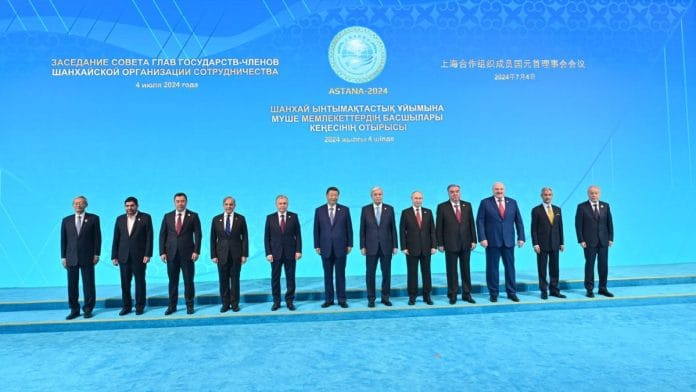New Delhi: Prime Minister Narendra Modi Thursday emphasised the need to respect “territorial integrity” and “sovereignty” at the Shanghai Cooperation Organisation (SCO) Summit in Astana, Kazakhstan. China is one of the founding members of the organisation, and President Xi Jinping attended the summit.
The remarks, however, were delivered by External Affairs Minister S. Jaishankar on behalf of the prime minister, after he decided to skip the summit.
“At this time, it is particularly noteworthy that we are reiterating mutual respect for sovereignty, independence, territorial integrity, equality, mutual benefit, non-interference in internal affairs, non-use of force or threat of use of force as a basis for our foreign policies. We have also agreed not to take any measures contrary to the principles of state sovereignty and territorial integrity,” said Jaishankar, reading out Modi’s remarks at the summit.
He added that “respect for sovereignty and territorial integrity” is necessary for “connectivity and infrastructure projects,” in a veiled reference to China’s Belt and Road Initiative (BRI) — the Beijing-led $1-trillion infrastructure and transportation project, of which India is not a member.
Modi’s remarks come as India and China’s border tensions continue for the fourth year after clashes between the two countries first broke out at the Galwan Valley in June 2020.
Before the summit, Jaishankar met with Chinese Foreign Minister Wang Yi, marking the first high-level exchange between the two countries since Modi returned to power in New Delhi for a third term last month.
Both ministers had agreed that the “prolongation” of the “current situation” at the border areas was not beneficial to either country. This is the first meeting between the two leaders in nearly a year.
“Discussed early resolution of remaining issues in border areas. Agreed to redouble efforts through diplomatic and military channels to that end. Respecting the LAC and ensuring peace and tranquility in the border areas is essential,” said Jaishankar in a post on X on the meeting between the two.
Met with CPC Politburo member and FM Wang Yi in Astana this morning.
Discussed early resolution of remaining issues in border areas. Agreed to redouble efforts through diplomatic and military channels to that end.
Respecting the LAC and ensuring peace and tranquility in the… pic.twitter.com/kR3pSFViGX
— Dr. S. Jaishankar (@DrSJaishankar) July 4, 2024
Jaishankar added that bilateral ties between the two countries would be guided by “mutual respect, mutual sensitivity and mutual interest.”
Also read: 90 mins is a long time in politics. Trump-Biden debate may be the push Democratic Party needed
29 meetings to de-escalate tensions
The two sides have held 29 meetings of the Working Mechanism for Consultation and Coordination on India-China Border Affairs (WMCC) along with 21 rounds of military level talks to de-escalate the tensions on the border.
The talks, however, have not led to de-escalation in certain areas of the border — a prerequisite for normalisation of ties between the two Asian countries for New Delhi.
Modi also extended his best wishes to China for its presidency of the 10-member regional organisation for the next year. Beijing is one of the founding members of the Eurasian regional organisation.
“I conclude by congratulating the Kazakh side for successfully hosting the SCO Summit and also convey our best wishes to China for the next presidency of the SCO,” said Modi in the prepared remarks.
India held the presidency of the organisation in 2023 and hosted a virtual summit last year.
The organisation, which was founded by the Shanghai Five — China, Kazakhstan, Kyrgyzstan, Russia and Tajikistan — was formally established as the SCO in 2001, with the addition of Uzbekistan.
India and Pakistan became observers at the SCO in 2005 and members in 2017, followed by Iran in 2023 and Belarus in 2024. It was during the previous Kazakh presidency of the organisation in 2017 that India and Pakistan became full members.
(Edited by Radifah Kabir)






